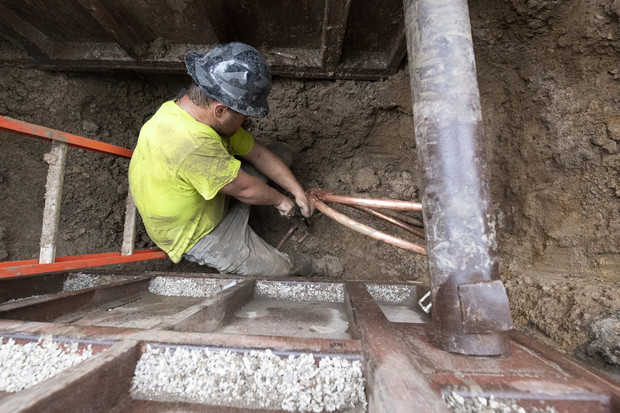Wisconsin Awarded $142 Million to Address PFAS, Lead Pipes
Federal funding comes from bipartisan infrastructure bill.

A worker who identified himself only as Nate flares copper tubing as a crew swaps out a lea.d water service line for copper pipes in Milwaukee on June 29, 2021. Since 2017, Milwaukee Water Works says it has replaced 3,881 pipelines made of potentially hazardous lead. Eliminating the city’s remaining 70,000 lead pipes at that pace would take more than 70 years and cost hundreds of millions of dollars. Isaac Wasserman/Wisconsin Watch
Federal environmental regulators have announced Wisconsin will receive $142.7 million to target removal of lead pipes, harmful forever chemicals and water challenges in underserved communities as part of the first allocation under the bipartisan infrastructure law.
U.S. Environmental Protection Agency Administrator Michael Regan announced the funding Thursday as part of $7.4 billion awarded to states and tribes under the $1 trillion bipartisan infrastructure bill signed into law by President Joe Biden on Nov. 15.
Around half of the funding will be made available as grants or loans to provide to rural and urban communities.
“Billions of dollars are about to start flowing to states and it is critical that EPA partners with states, Tribes, and territories to ensure the benefits of these investments are delivered in the most equitable way,” said Regan in a news release.
In a letter to Gov. Tony Evers, Regan urged prioritizing grants for disadvantaged communities.
“To further aid states, tribes, local governments and water systems, the EPA will also provide technical assistance to help disadvantaged communities overcome barriers in applying for and receiving loans and grants through the (state revolving loan funds),” wrote Regan.
State revolving loan fund programs offer low-cost financing to help communities repair or upgrade water and wastewater infrastructure.
Assistant Administrator of the EPA’s Office of Water Radhika Fox will soon issue guidance to state agencies on how they should use the funding provided under the law. In his letter, Regan urged states to correct disparities with funding, make progress on replacing lead service lines and provide relief to communities struggling with contamination from harmful perfluoroalkyl and polyfluoroalkyl substances (PFAS).
As for PFAS, state environmental regulators have detected 51 sites within 25 communities that have PFAS polluted groundwater. However, less than 1 percent of the state’s more than 11,000 public water supplies have been tested for the chemicals. PFAS has been found in public and private wells in communities across the state, including Peshtigo, Campbell, Marinette, La Crosse, Eau Claire, Rhinelander and Madison.
The funding under the infrastructure bill represents the single largest investment in water infrastructure in decades, but the needs are great. The American Society of Civil Engineers estimates Wisconsin water and wastewater systems need around $15 billion over the next two decades to address aging infrastructure.
Wisconsin receives $142M to combat water challenges under bipartisan infrastructure law was originally published by Wisconsin Public Radio.
More about the Lead Crisis
- Rep. Madison Proposes Restoring Local Control Over Lead Inspections - State Rep. Darrin Madison - Jan 6th, 2026
- $43 Million Later, MPS Says Classrooms Are Safe From Lead Dust - Corrinne Hess - Dec 18th, 2025
- MPS Buildings Cleared of Lead-Paint Risks after 10-Plus Months of Work - Milwaukee Public Schools - Dec 17th, 2025
- Wisconsin Moves to Require Lead Service Lines Replaced By 2037 - Danielle Kaeding - Dec 11th, 2025
- Gov. Evers, DNR Announce More Than $159 Million to Ensure Clean, Safe Drinking Water for Wisconsinites in 29 Municipalities - Gov. Tony Evers - Dec 10th, 2025
- EPA Announces $3 Billion in New Funding for States to Reduce Lead in Drinking Water - U.S. Environmental Protection Agency - Nov 25th, 2025
- Wisconsin Communities Get $282 Million for Drinking Water Projects - Danielle Kaeding - Nov 19th, 2025
- MKE County: County Launches Lead Abatement Program - Graham Kilmer - Nov 9th, 2025
- Milwaukee County Launches Lead Remediation Program to Reduce Lead-Based Paint Hazards in Homes in Suburban Communities - David Crowley - Nov 5th, 2025
- Wisconsin Improves Child Lead Testing Rates, Urges Continued Testing and At-Home Prevention - Wisconsin Department of Health Services - Oct 21st, 2025
Read more about Lead Crisis here
More about the PFAS Problem
- PFAS Levels in Great Lakes Fish Are Dropping - Danielle Kaeding - Feb 6th, 2026
- Gov. Evers and GOP Lawmakers Near a Deal on PFAS Pollution - Danielle Kaeding - Jan 22nd, 2026
- Gov. Evers Optimistic About Reaching Final Deal With Republican Lawmakers to Secure Release of $125 Million in Long-Awaited Pfas Investments - Gov. Tony Evers - Jan 21st, 2026
- Bipartisan Push to Tell Counties Faster When Water Tests Fail - Henry Redman - Dec 19th, 2025
- MKE County: County Seeks to Sue PFAS Producers, Oil Companies - Graham Kilmer - Dec 10th, 2025
- Wisconsin Reviewing EPA-Approved Pesticides For PFAS - Danielle Kaeding - Dec 9th, 2025
- State Nears Settlement with Johnson Controls/Tyco Over PFAS Spills - Danielle Kaeding - Dec 4th, 2025
- Senate Bill Promotes Soybean-Based Firefighting Foam to Replace PFAS - Danielle Kaeding - Dec 2nd, 2025
- Test Results Show High PFAS Levels in Wisconsin’s Landfill Runoff - Danielle Kaeding - Dec 2nd, 2025
- Wisconsin Communities Get $282 Million for Drinking Water Projects - Danielle Kaeding - Nov 19th, 2025
Read more about PFAS Problem here




















